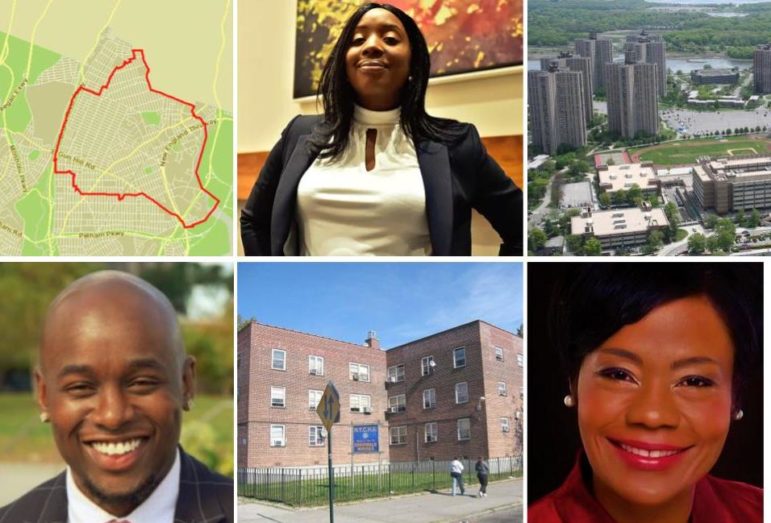The 12th district, which covers the northeast Bronx, has seen two consecutive Council members ousted for corruption. Six months to the day after a special election elevated Kevin Riley to the seat, he faces two rivals on Primary Day.

Daniel Rouse, Jim Henderson, NYCGIS and Council campaigns.
The 12th district includes the soaring towers of Co-Op City and the sprawling campus of NYCHA’s Edenwald Houses. Shanequa Moore, Councilmember Kevin Riley and Pamela Hamilton-Johnson are running for the 2021 Democratic Council nomination there.Council Countdown is a partnership of City Limits, City & State, Gotham Gazette and the Queens Daily Eagle, offering coverage of the 2021 New York City Council races.
Three days before Christmas, Kevin Riley prevailed in a special election to fill the District 12 City Council seat vacated when Andy King was expelled. Now, Riley faces a primary as he tries to win the seat for a full term.
One of his opponents in December, Pamela Hamilton-Johnson, is again in the mix. A newcomer, Shanequa Moore, is also on the ballot.
The district covers a north central chunk of the Bronx, including the neighborhoods of Wakefield, Olinville, Edenwald, Eastchester, Williamsbridge, Baychester and Co-op City, and encompassing thousands of one- and two-family homes, NYCHA buildings and soaring residential towers.
Community District 12, which overlaps much of the Council district, has an abnormally high share of residents who are rent burdened—some 52 percent, above the Bronx-wide average—and also one of the lowest shares of people who are not English proficient, only 9 percent. Unemployment is relatively high at 6.3 percent, but the poverty rate of 20.9 percent is closer to the citywide average (19.8 percent) than the Bronx-wide figure (26.2 percent).
In its most recent statement of needs, Board 12 identified street-tree maintenance, quality-of-life issues like noise and graffiti and trash removal on commercial strips as the three most pressing issues facing the area.
King served the Council from 2012 until last August, when he was ejected over corruption allegations. King’s predecessor, Larry Seabrook, was also removed from the Council for corruption.
Riley, a former aide to Assembly Speaker Carl Heastie, won the December special election with 68 percent of the vote. Hamilton-Johnson, a local nonprofit leader, drew 25 percent and a third candidate, attorney Neville Mitchell, took about 3 percent. Turnout was about 7.5 percent.
Riley’s current term expires on Dec. 31. The June primary and November general election will determine who represents the area for 2022 and 2023 (Council terms are normally four years, but because the Census might require redistricting, the next term will run two years).
A rookie incumbent
Riley sits on nine committees (Education, Land Use, Mental Health, Parks and Recreation, Public Housing, Public Safety, Sanitation and Solid Waste Management, Youth Services and Criminal Justice) and chairs a subcommittee (Landmarks, Public Sitings, and Dispositions)—a fairly hefty workload. He has yet to sponsor a bill—he tells City Limits that one is coming but would not discuss its content—but he has co-sponsored six bills, two of which have been enacted. Among the measures that Riley has signed on to that have not yet become law is a bill that would require employers to rehire workers laid off during the pandemic before they bring on new employees. He is also among the few who have stood up to support a bill to create an elected civilian police review board.
He says he was surprised by the amount of training that new Councilmembers receive—the amount of time studying issues affecting the district, while also getting to see the kind of resources other districts have. “Something that I did realize now that I have become a member is the parks in this community,” Riley says. “I’ve been subjected and used to the parks in our community. Now, speaking with other members and visiting parks in other communities, I’ve realized our parks need a ton of work.”
Riley says he’s already targeted some of the more pressing issues in the district. He organized a community cleanup, is supporting an e-scooter pilot program and has pushed for expanded Cure Violence programs at local police precincts.
While he has not raised a lot of money, his list of donors is dotted with members of the political establishment: State Sen. Jamaal Bailey, the Bronx Democratic chair, is there, as is State Assembly Speaker Carl Heastie, two sitting Councilmembers and a host of legislative aides and political staffers. Riley insists, however, that he represents a new, inclusive kind of politics. “I make sure that everyone has a voice at the table,” he says. When it comes to the decision of who the next Council speaker will be, however, Riley makes clear that he will vote the way the county Democratic organization directs. “We’re better and stronger together,” he says. “I think it’s best if we work together with the county.”
A new voice
Moore is a licensed social worker, the founder of a nonprofit that provides mental health services to children and a community board member. A Bronx native, she’s the single mom to a nine-year-old daughter. “I’m ready to transition to a higher position to really advocate for children and families in City Hall,” she says.
Her top policy concern is the recovery from COVID-19—not just the immediate need for widespread vaccination, but the deep learning loss experienced by children in the district. Making up for lost time is key, but “we can’t do that without a real plan,” Moore says. “That means academic support. That means we have afterschool programs for all children. That’s making sure we’re working with our [Community Based Organizations] to make sure we’re providing early childhood services And making sure we have a safety plan in our schools.”
Community mental health access is another of her goals, as is housing stability. “The root of the issue is, frankly, that our housing system is not working. We’ve shifted from seeing housing as a human right to a privilege. That narrative has to change.”
So far, fundraising in the race has been scant. Riley reported $21,000 in receipts and $16,000 on hand in mid-April. Hamilton-Johnson has $100 and Moore had yet to report anything. But Moore tells City Limits she has raised cash since then and expects to have enough to compete.
A veteran challenger
Hamilton-Johnson has run for the seat three times before; she ran in the 2012 special election to replace Seabrook, then challenged King in 2013 and 2017. She founded the multi-service nonprofit Urban Neighborhood two decades ago, serves as the 47th Precinct Community Council president, is vice president of the Department of Youth and Community Development’s neighborhood advisory board, sits on the citywide Participatory Budgeting advisory board, and is a consultant to the Department of Education and a former school district president.
She did not respond to requests for an interview, but told City Limits in December: “There has never been a woman who has sat in this seat. Throughout the Bronx women find it very hard to run for seats because [the Bronx Democratic organization] is not giving the golden ticket to women in the Bronx. We have had two City Councilmembers who have left office and yet we keep voting for the same people over and over again. I am going to be the first woman who has ever won this seat.”
Moore would say the same. She was a write-in candidate in the December special election, but attracted only 21 votes out of 7,161 cast. In 2013—the last time there was an open mayoral race to draw primary voters—15,000 voters participated in the 12th district Council race. Moore is hopeful that a bigger slice of the district will turn out in June than did in the depths of winter, and that it will lean her way.
“There’s this sense of people feeling like whether they are civically engaged, whether they vote or not, the outcome is preconceived,” she says. “There’s a huge percentage in my district who did not get to cast their vote.”
They’ll get that chance starting with early voting on June 12.










One thought on “One of the Council’s Newest Members Faces a Veteran Challenger and a New Voice”
Thanks this helped